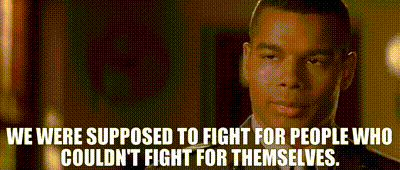The Moral Battlefield of Obedience and Integrity in A Few Good Men
My students in Film as Literature are watching A Few Good Men. Besides just being an overall great film, it is a movie ripe for discussions about power, obedience, morality, and ethics.
I decided to see where my students thought about the main concept of the film by asking them this question:
The “Code Red” in A Few Good Men exposes how institutional pressure and group loyalty can blur the line between right and wrong. How does the film challenge the idea that following orders is an acceptable defense for unethical actions, and what does it suggest about personal accountability within rigid systems like the military?
One thing that I like to do is write the same essay that the students have to write.
You can read it below.
The Moral Battlefield of Obedience and Integrity in A Few Good Men
In the film A Few Good Men the act of the “Code Red” is far more important than an act of hazing, it becomes a lens through which the audience deals with the collision between loyalty, authority and morality. This courtroom drama is used to challenge that belief that “following orders” can excuse unethical behavior and that being a part of a “rigid system” and its ability to shape one’s personal sense of duty begs inspection. Ultimately, A Few Good Men places us squarely in the middle of deciding whether or not personal accountability can be waived by institutional authority, or does true honor lie in the courage to question authority as opposed to blindly following it?
The world of A Few Good Men is built on strict adherence to hierarchy within a given system, namely the United States Marine Corps and United States Navy. Inside this system there is a zero tolerance policy for those who do not follow orders without hesitation. On the surface, this might seem like a logical method of operation being in such close proximity to enemy soldiers who train incessantly with the expressed purpose to kill Americans. Based on the amount of danger the marines in this story live in, unswerving loyalty and instant response seems to make a great deal of sense. There is, however, an inherent downside to this mindset: It breeds moral and ethical complacency. Why would a soldier need to think on their own? They have been trained that this is their duty to accept orders without any form of consideration for whether or not the order is legal or ethical. Colonel Jessup reinforces these ideals by saying that this mindset is necessary for the protection of the nation and that absolute obedience is a requirement to that end. But a price is paid for the ideals he supports. The flaw in this logic is that people commit terrible acts when their conscience is deactivated by the conditioning of leadership.
Lieutenant Daniel Kaffee has a distinct character arc. It exemplifies the decision making process between compliance and moral awakening. In the early parts of the movie we see the ultimate representation of the easy route -- he cuts deals, avoids conflict and the courtroom all while treating court cases as procedural tasks instead of moral exercises of right and wrong. His methodology is to create scenarios where the amount of work to see justice done for an opposing lawyer becomes so outrageous that they reduce the consequences in a plea bargain and therefore avoid the courtroom.
Kaffee has a very limited idea about the mindset one has to have to be a marine. The high-minded duty and the acceptance of orders with little or no real consideration simply does not compute in his comparatively pampered little world. His self-awareness increases as the movie progresses, wondering why such an inexperienced lawyer with a history of plea bargaining be given a murder trial. But as the trial progresses, Kaffee begins to see the deeper implications of the “Code Red.” He began to believe that there was more at stake in this case than a “set of steak knives”. His decision to put Colonel Jessup on the stand and challenge him in the courtroom could be considered a turning point for Kaffee. When Jessup shouts, “You can’t handle the truth!”, the audience witnesses the moment when institutional arrogance collides with moral truth. Jessup believes that his authority and his mission justify all actions, that the end justifies the means, but the trial exposes that belief as both dangerous and self-serving. In contrast, Kaffee’s pursuit of justice shows that true strength lies not in obeying orders, but in holding those in power accountable for their actions as well those under their command.
In the film's waning moments, A Few Good Men makes abundantly clear that moral responsibility cannot be transferred up the chain of command. Simply because you were given orders, does not mean you do not bear responsibility for the outcome of carrying out those orders. In a bleak reminder that although Dawson and Downey were not found guilty of murder -- they were convicted of “conduct unbecoming of a Marine” -- we all bear the weight of our choices. Dawson explained the verdict to Downey saying, “We were supposed to fight for people who couldn’t fight for themselves. We were supposed to fight for Willy.” This reflection demonstrates his understanding that while the system may demand obedience, morality and ethics requires courage.
Loyalty and morality are not the same thing. There are places such as the military where obedience can be a facade for injustice. Being loyal to a commanding officer does not mean you cannot show courage standing against wrongdoing -- even when it comes from above. The excuse “just following orders” holds no validity when considering that personal accountability is not optional. Personal accountability is the foundation of true honor. A Few Good Men shows us that having integrity is not about doing what we are told -- it is about always doing what is right.

